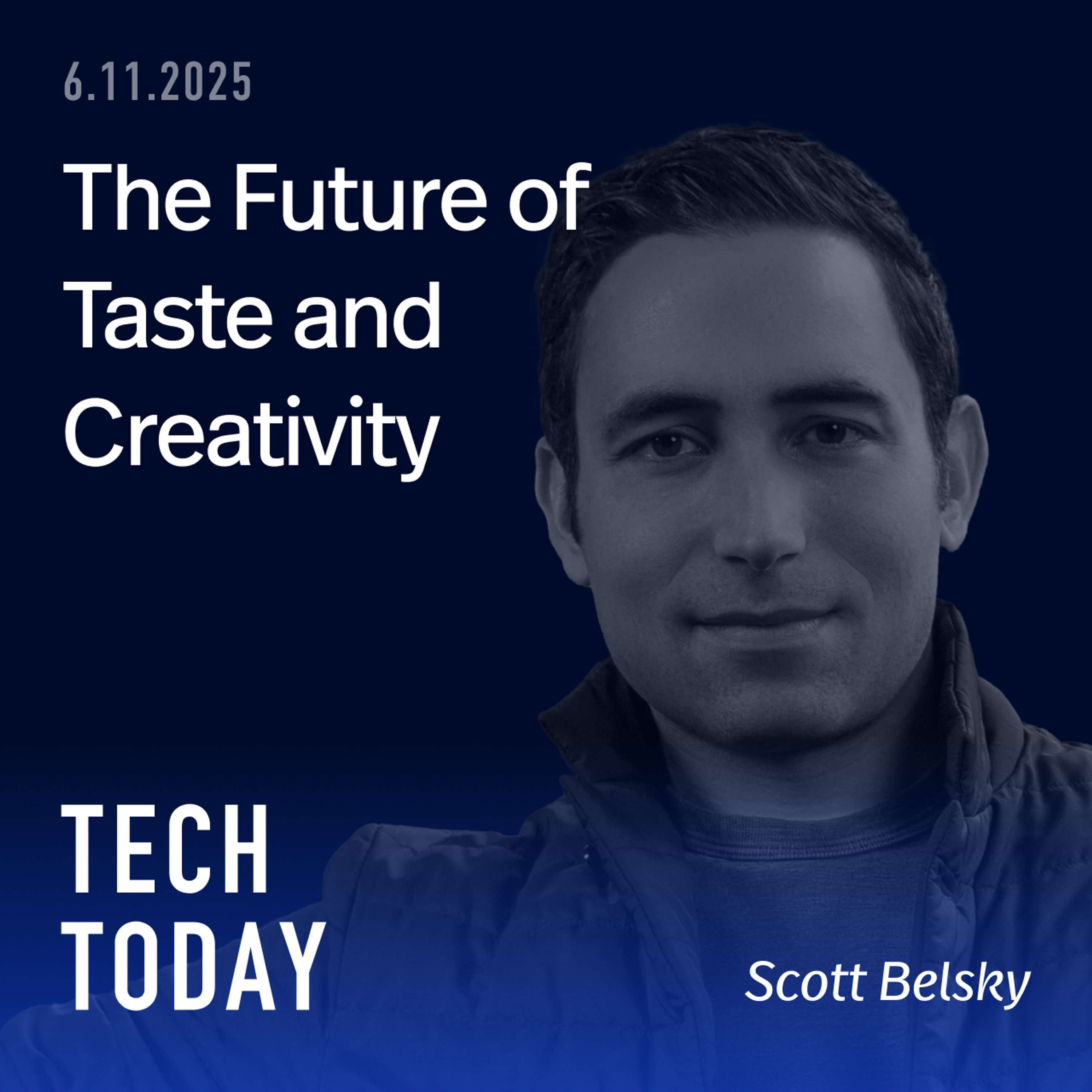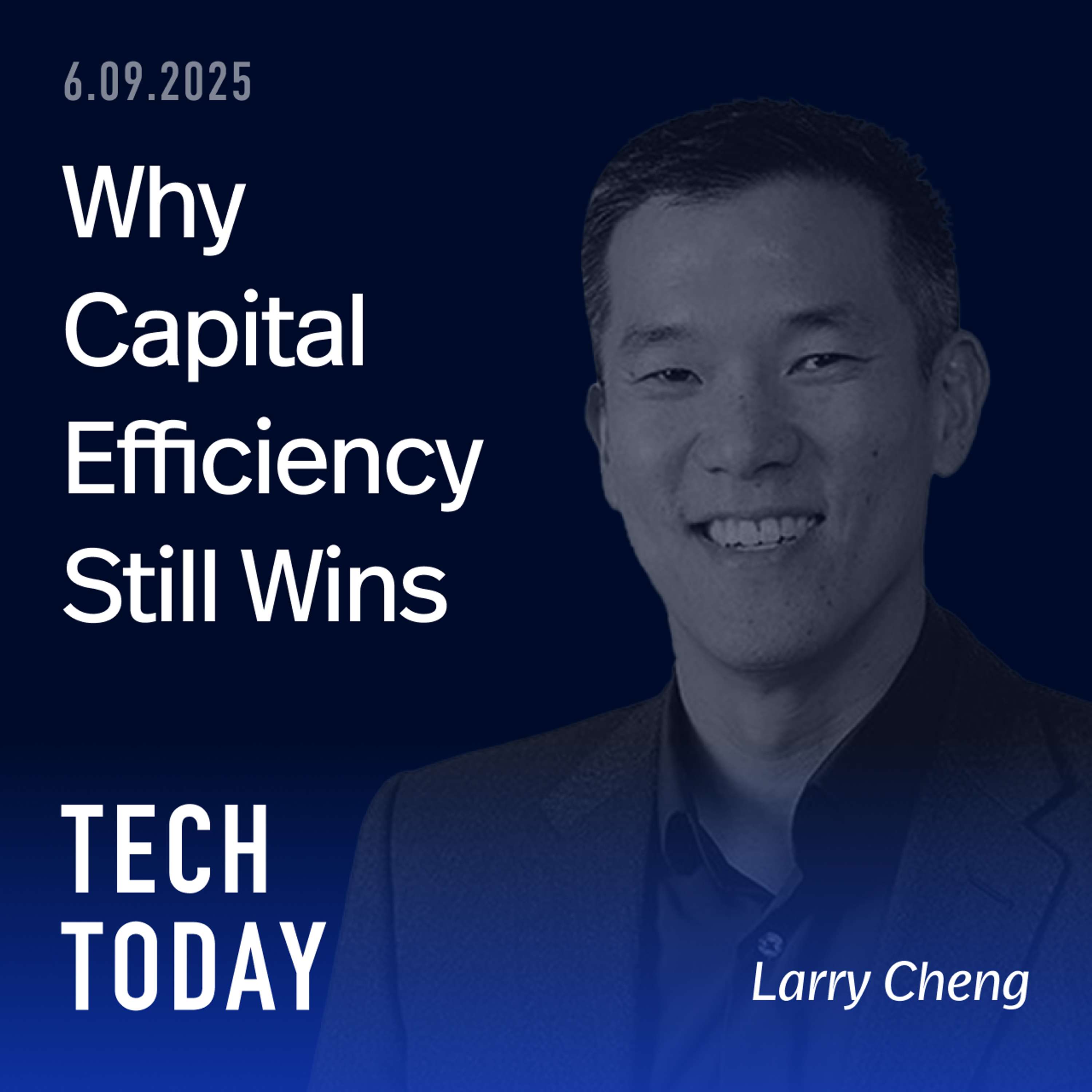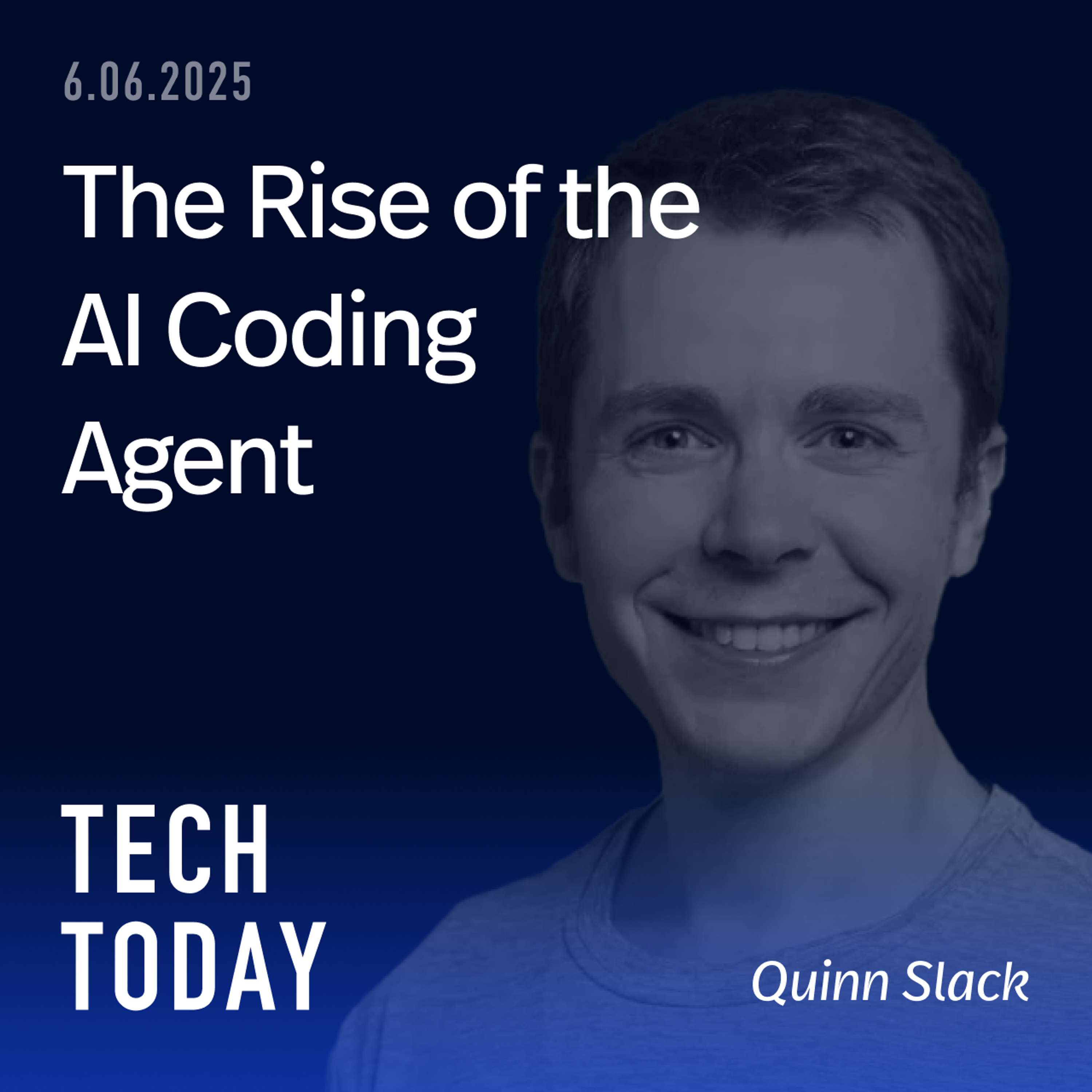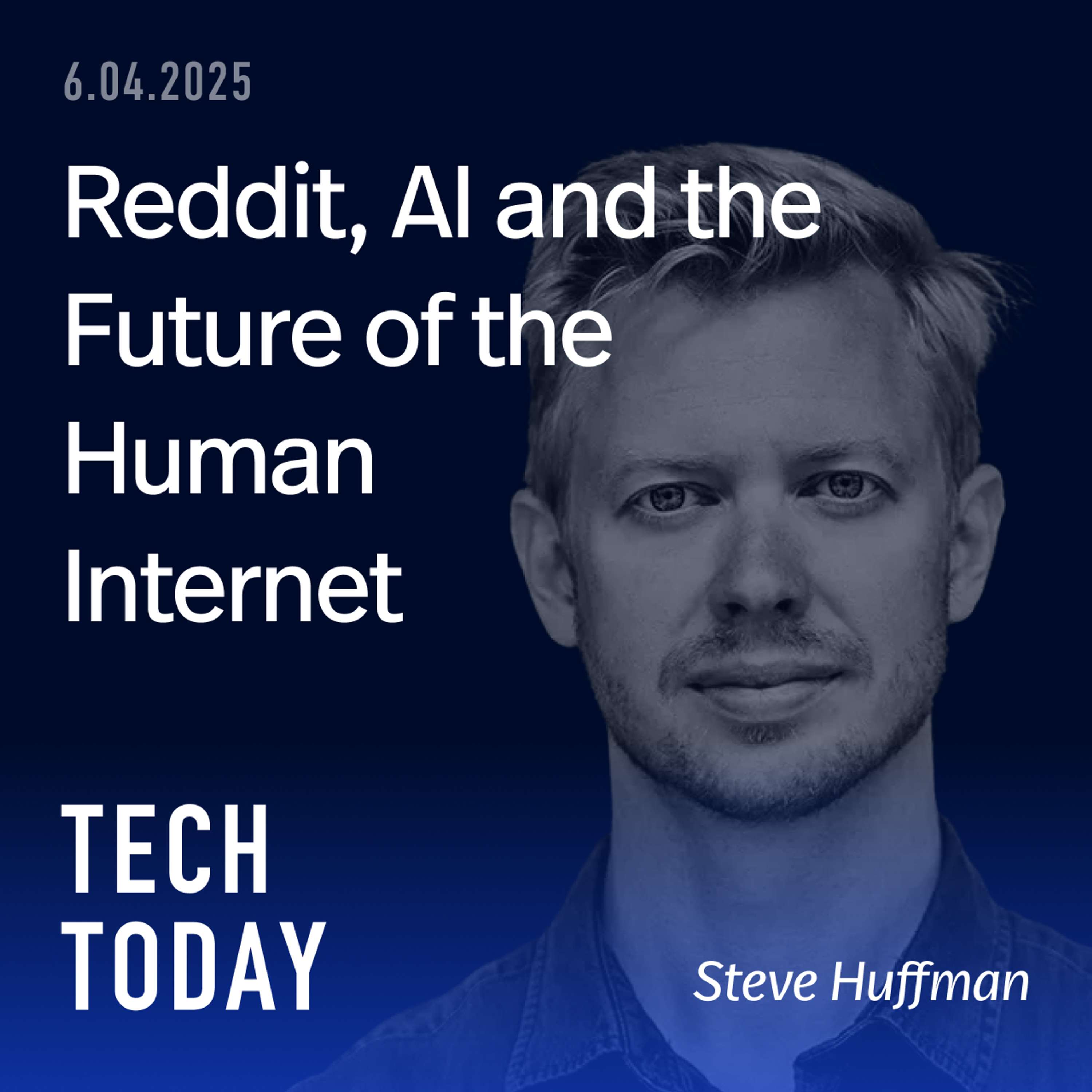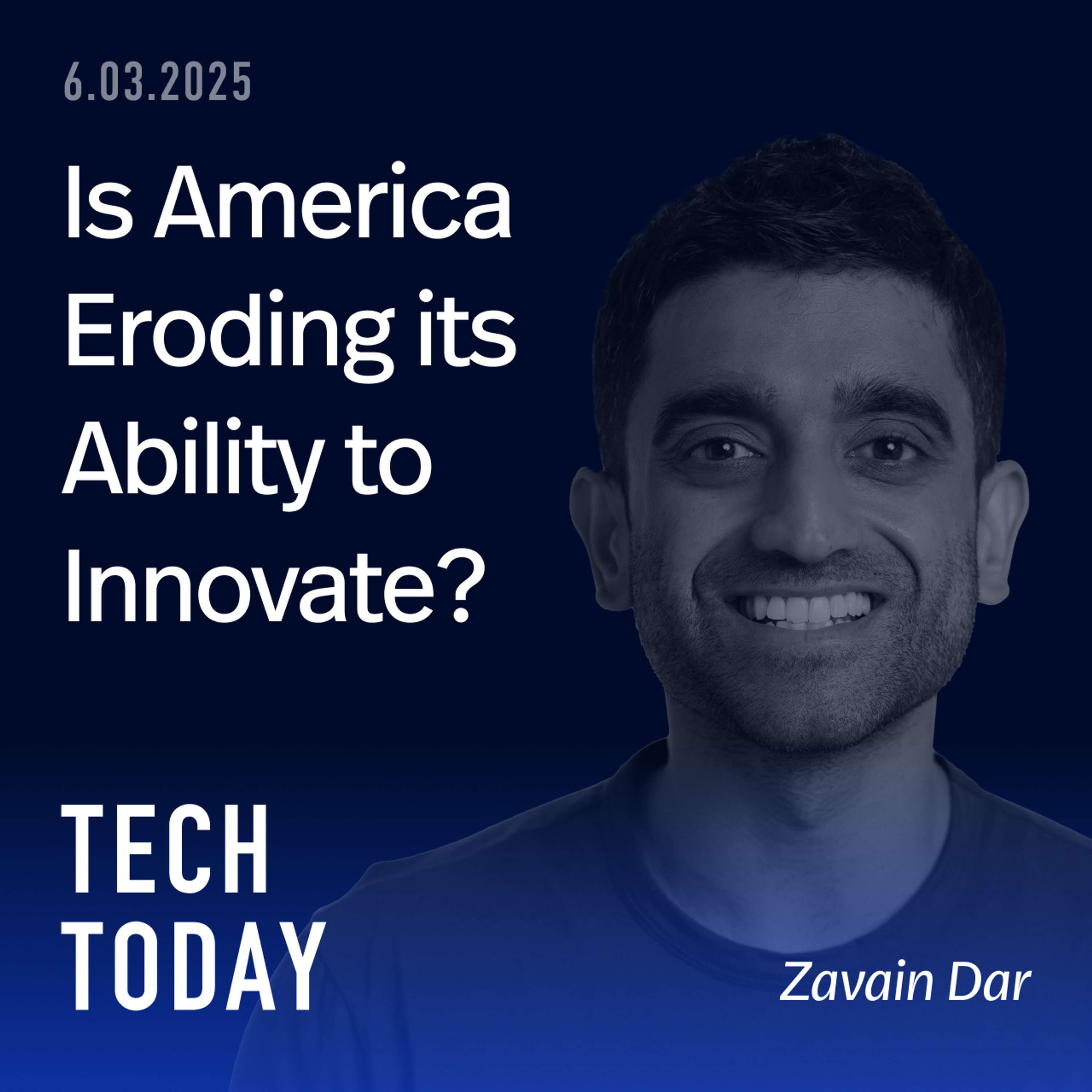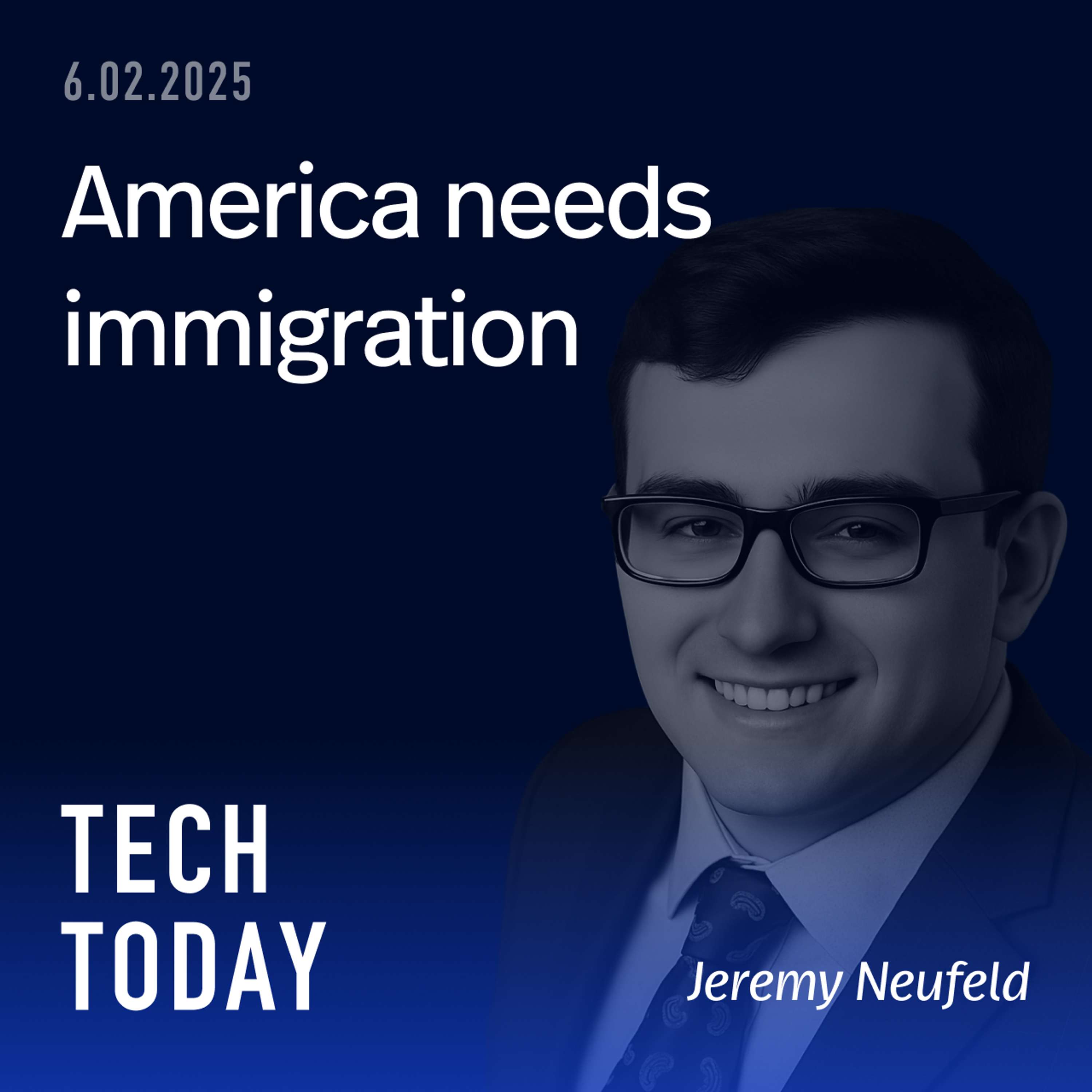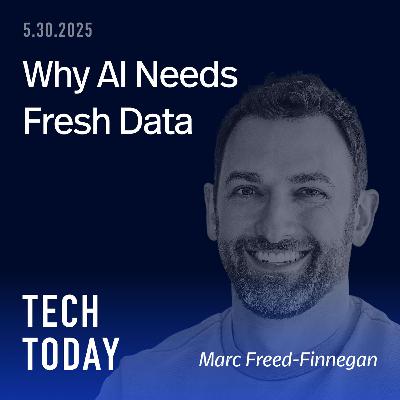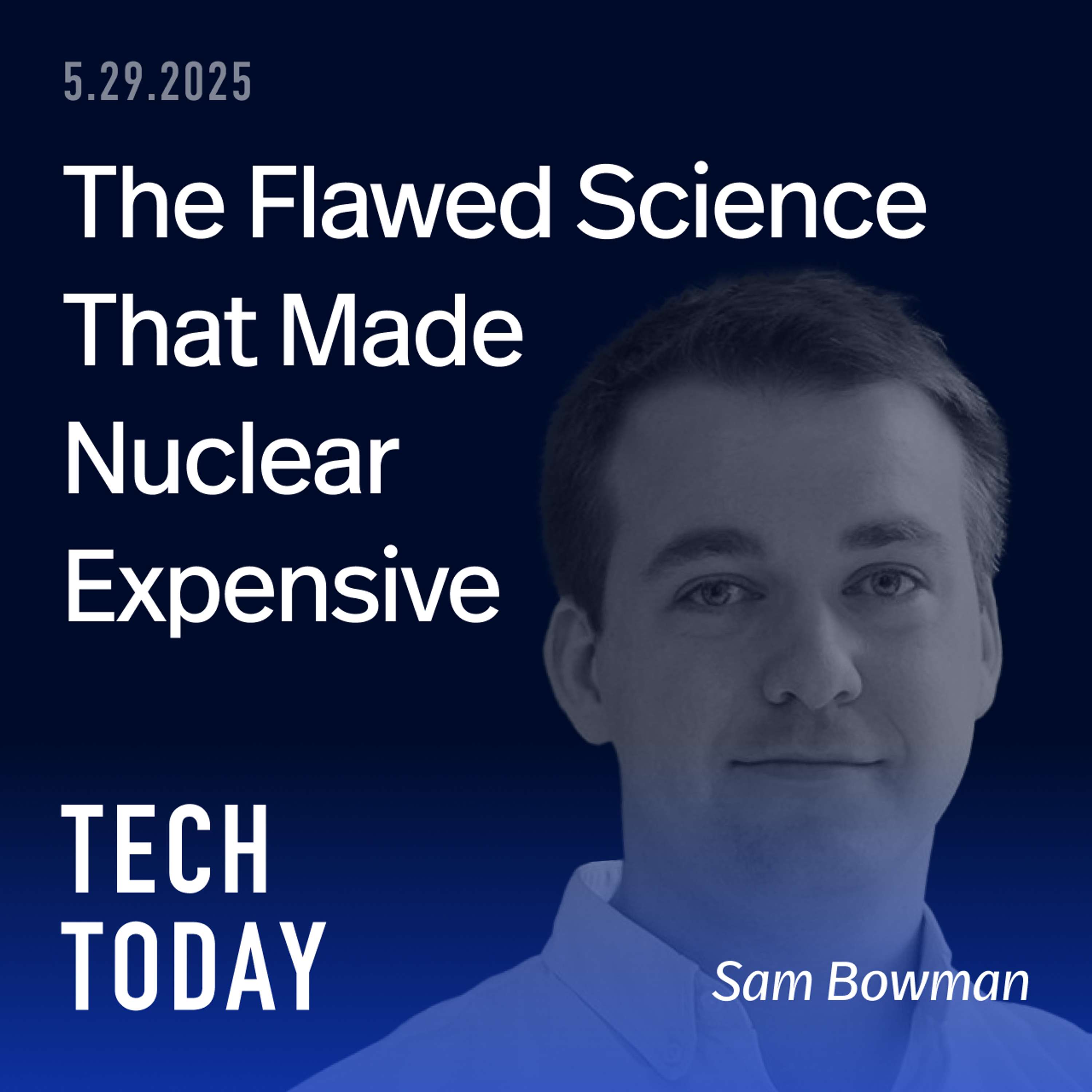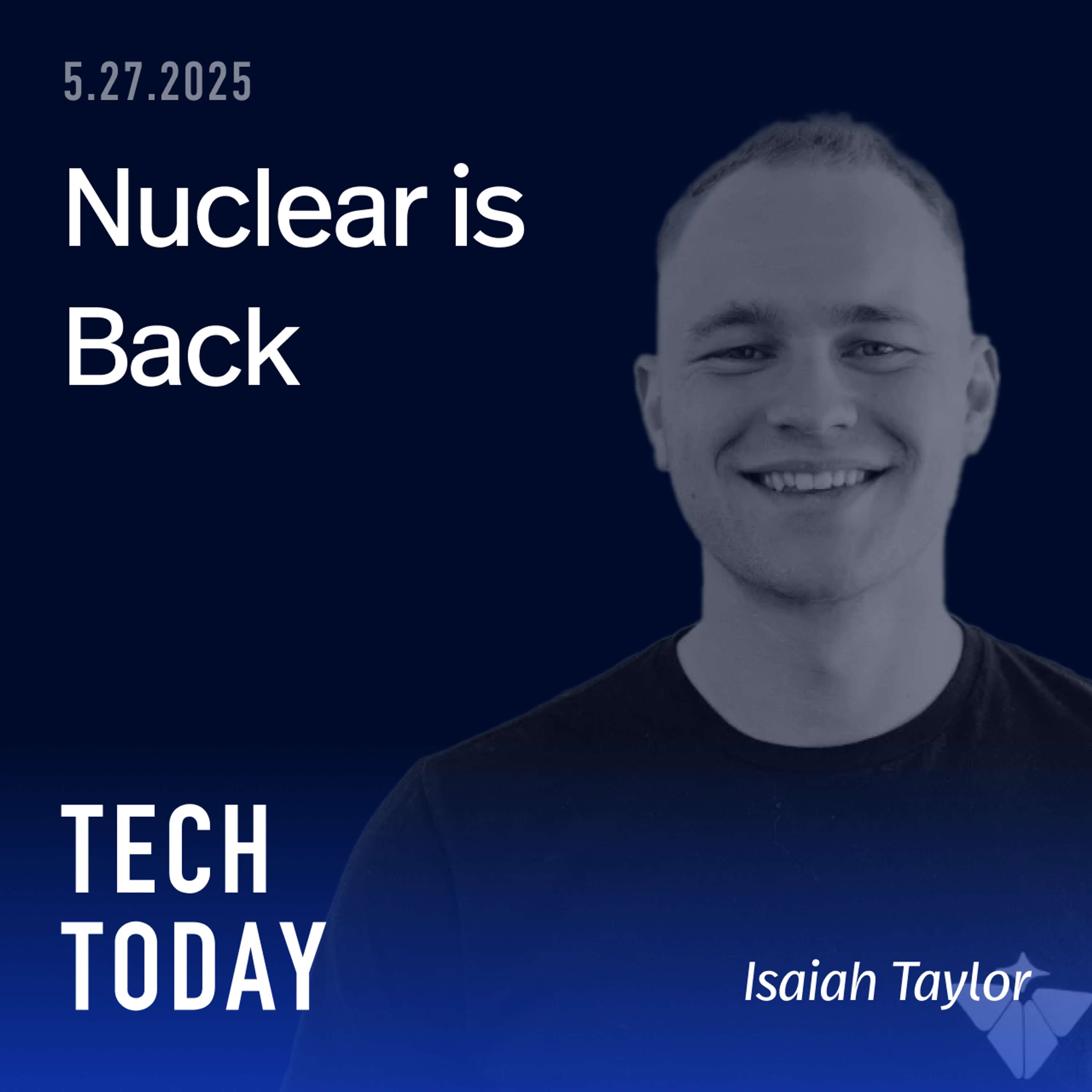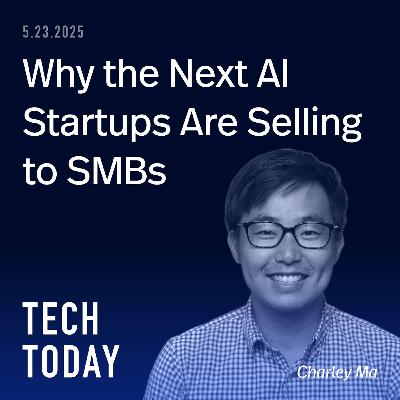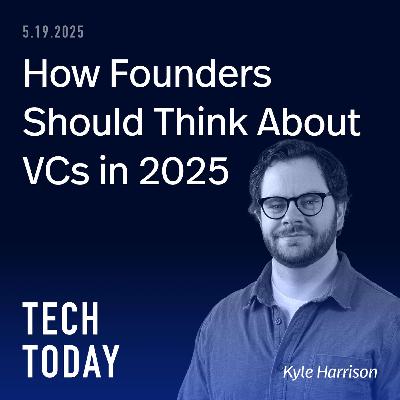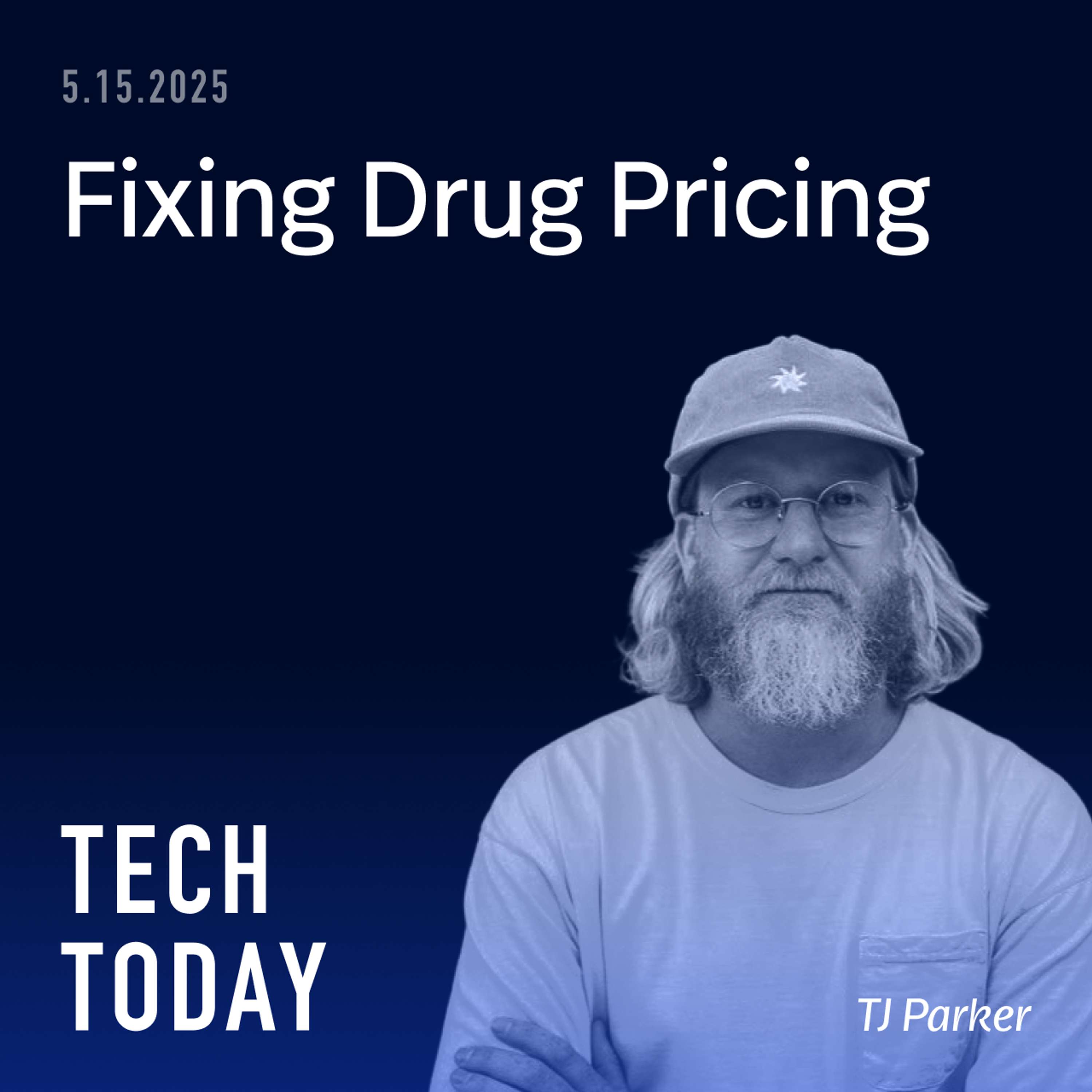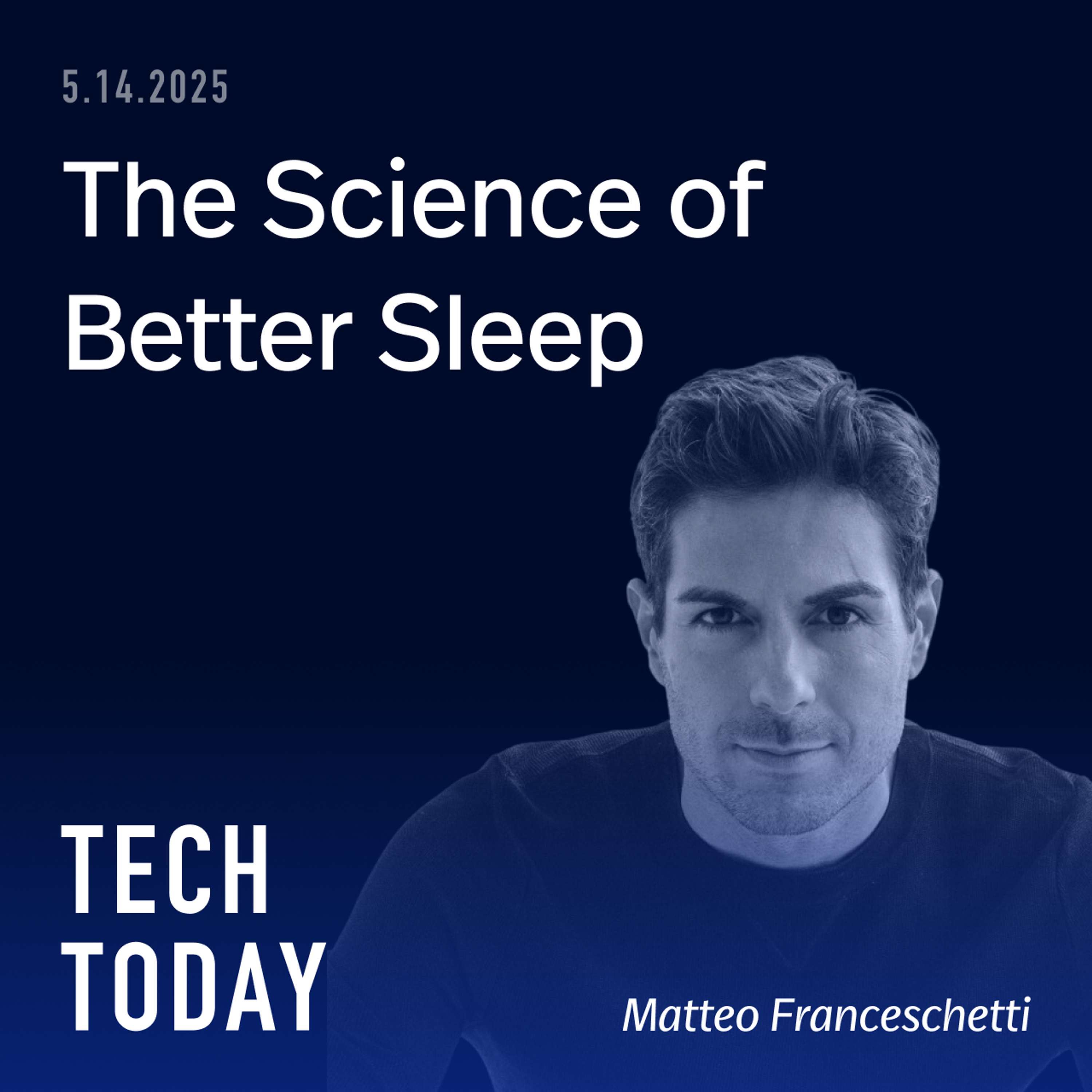Discover Tech Today with Eric Tarczynski
Tech Today with Eric Tarczynski

47 Episodes
Reverse
Scott Belsky, partner at A24 and former Chief Product Officer at Adobe, joins us to explore how AI is reshaping the creative process. We talk about the rise of taste as a differentiator in a world of infinite content, the shift from production to ideation, and how brand-building evolves when machines can generate at scale.Scott also shares his perspective on the importance of story and process, why behind-the-scenes footage will matter more than ever, and how creators can cut through the noise by focusing on authenticity and meaning. We dive into his view that we're still in the early innings of the AI-creative intersection, and why that may be a good thing.We also covered Glean’s $7.2 billion valuation, Mistral’s new reasoning models, Linear’s $82 million fundraise, and Snap’s upcoming consumer AR glasses, Specs, set to launch in 2026.
Beezer Clarkson, managing director at Sapphire Partners, joins the show to unpack the state of venture funding from the unique perspective of an LP. We dive into why 2025 has been one of the toughest fundraising environments for venture firms in over a decade, what’s driving LP caution, and how structural shifts, like longer fund durations and fewer exits, are reshaping the market.Beezer explains why many emerging managers are struggling to close new funds, how secondary markets are evolving as a partial solution, and why “knowing your math” matters more than ever when fundraising. We also get into why LPs still believe in venture’s long-term importance despite growing selectivity in where they place their bets.We also covered Apple’s new Liquid Glass interface, Lovable’s funding talks, IonQ’s $1B quantum deal, and Waymo suspending service in LA
Larry Cheng, co-founder and managing partner at Volition Capital, joins us to explore why capital efficiency is more important than ever for founders. He explains how capital discipline can coexist with high growth, shares lessons from backing Chewy early, and breaks down why the best companies know how to build without overspending.We also dig into the resurgence of CapEx in frontier tech. Larry shares how Volition is thinking about hardware-enabled SaaS, and offers a framework for evaluating return on capital — whether you're acquiring users, building hardware, or rolling up businesses.We also covered Circle’s explosive IPO, the Rippling–Deel legal battle, Alpha School’s AI-powered academic results, and Anthropic’s appointment of a national security advisor to its board.
Quinn Slack, co-founder and CEO of Sourcegraph, joins Kyle to explore how AI is transforming software development and why the “AI coding agent” is becoming the center of gravity in the modern engineering stack. Quinn walks through Sourcegraph’s new tools—Cody and AMP—and explains how model-product fit, not feature checklists, is what will define winners in this fast-moving market.They discuss why Sourcegraph made counterintuitive bets like hiding model selection and emphasizing multi-tenant design, how customer trust enables bold product choices, and why building in sync with new model capabilities is more important than chasing traditional differentiation.We also covered Anysphere’s $900 million fundraise at a $9.9 billion valuation, Anduril’s $2.5 billion round at a $30.5 billion valuation, OpenAI’s court battle over chat log retention, and Anthropic’s launch of Claude Gov models for classified U.S. environments.
Hermeus just became the first private company to fly a hypersonic-capable aircraft — and it’s only the beginning.Today, AJ Piplica, founder and CEO of Hermeus, joins to break down the first successful flight of the Quarterhorse Mk 1, explain what hypersonic flight actually is, and share why this milestone could reshape both national defense and commercial aviation.We also covered Reddit’s lawsuit against Anthropic, Windsurf’s model access problems, Bolttech’s $147M fundraise, and Mistral’s new AI coding assistant
Reddit has always been a cultural force online — but today, it's also something else: a core piece of the internet’s AI infrastructure.In this episode, Reddit co-founder and CEO Steve Huffman joins Eric to talk about the company’s first year as a public company, why Reddit still feels like it’s just getting started, and how it’s navigating a new era where AI-generated content is flooding the internet. They discuss Reddit’s evolution from a link aggregator to a community engine, the irony of becoming an LLM training backbone, and why Huffman thinks Reddit can preserve its human core even as it grows.We also covered recent headlines including SpaceX’s projected $15.5 billion in revenue for 2025, Meta’s billion-dollar deal to extend the life of an Illinois nuclear plant, Colossal Labs’ plan to release dire wolf howls later this year, and Amazon’s newly announced film about the OpenAI boardroom drama.
Today on Tech Today, Kyle is joined by Zavain Dar, founder and managing partner of Dimension, to talk about what he calls the “self-inflicted corrosion” of American hegemony. In a viral tweet, Zavain laid out two pillars of the U.S.’s strength, immigrant-driven innovation and global alliances, and argued that both are being systematically undermined. In this episode, he explains why the U.S. is pouring concrete over the very wellspring of scientific and technological leadership that made it dominant for decades.They also discuss the immigrant roots of America’s most valuable companies, the geopolitical dynamics forcing allies to hedge toward China, and how elite researchers and founders are starting to bypass the U.S. altogether.We also covered Neuralink’s $650 million raise, xAI’s $5 billion debt deal, IBM’s Seek AI acquisition, and TechCrunch’s exit from Europe.
Immigration isn’t just a humanitarian issue—it’s a strategic lever for American innovation. Jeremy Neufeld, Director of Immigration Policy at the Institute for Progress, joins us to explain how student visas, OPT, and H-1Bs quietly power the U.S. tech and startup ecosystem. He breaks down why high-skilled immigration is essential to America’s edge in AI, what a modern-day “Project Paperclip” might look like, and how visa policy missteps are helping competitors like China.We also get into why 70% of top AI startup founders came through the student visa pipeline—and why only a fraction get to stay. Plus, Jeremy lays out the path forward for building a more talent-friendly immigration system that strengthens national security rather than weakens it.We also covered a new potential dwarf planet beyond Neptune, Grammarly’s $1B revenue-based financing deal, Andreessen’s latest AI megadeal, and China’s bid to lead the humanoid robot market.
Marc Freed-Finnegan, co-founder and CEO of Chalk, joins us to talk about why AI infrastructure needs to shift from training to inference—and how Chalk is powering sub-5ms pipelines for customers like Whatnot, MoneyLion, and Sunrun. He explains why Chalk is taking on Databricks, why fresh data is more valuable than ever, and what it means to run Python at real-time scale.We also dive into Marc’s fintech roots, Chalk’s origins, and the company’s approach to supporting complex ML use cases across fraud detection, content moderation, and clean energy. Plus, Marc shares his take on why infrastructure—not models—is often the biggest bottleneck in getting AI into production.Finally, we covered Amazon’s first AI licensing deal with The New York Times, Meta’s XR partnership with Anduril, Anthropic CEO Dario Amodei’s warning about AI job losses, and a $38M raise for grid tech startup Heron Power.
In this episode, Kyle talks with Sam Bowman, editor of Works in Progress and Head of Publishing at Stripe, about one of the most important but under-discussed ideas in energy policy: the regulatory science that made nuclear energy unaffordable. Sam unpacks the origins and impact of the Linear No Threshold (LNT) radiation model and the ALARA regulatory principle, and explains how they led to decades of cost overruns and stagnation in nuclear power. They also dive into the editorial mission behind Works in Progress, how it surfaces “new and underrated ideas to improve the world,” and why optimism, practicality, and longform rigor are at the heart of the magazine’s approach. We also covered Salesforce’s Informatica acquisition, AI models sabotaging shutdown scripts, shrinking entry-level roles in tech, and Apple’s plans for smart glasses.
Isaiah Taylor — founder and CEO of Valar Atomics — joins us to unpack a bold new push from the White House: a set of executive orders signed by President Trump aimed at reviving domestic nuclear energy. He breaks down what’s in the orders, why they matter, and how they could reshape US energy and industrial policy over the next decade.We also dive into the realities of building modern nuclear infrastructure. Isaiah explains why uranium independence is critical, how the US lost its lead in the global race, and why he sees nuclear as a key part of the long-term energy mix—alongside fossil fuels.Finally, we cover AI avatars showing up on investor calls, a new Zoox recall after a scooter crash in San Francisco, President Trump’s tariff threats against Apple and Samsung, and Foxconn’s unexpected move into semiconductors.
Charley Ma, co-founder and Managing Partner at Pathlight, joins us to unpack the changing landscape of AI adoption across SMB and enterprise segments. He shares why the most promising vertical AI startups are being led by younger, first-time founders—and why these teams are winning by building fast, iterating directly with customers, and delivering products that “just work.”We also dive into Pathlight’s thesis on govtech as an emerging AI opportunity. Charley explains why local governments are more ready than ever to adopt new tech, how procurement barriers are changing, and why this is a once-in-a-generation opening for builders in the public sector.Finally, we cover Google’s launch of Veo 3, Anthropic’s new Claude 4 models, OpenAI’s $7B data center loan, and Mozilla shutting down Pocket.
Today, Rex Woodbury, Founder and Managing Partner at Daybreak Ventures, joins Kyle Harrison to share his reactions to new AI product announcements at Google I/O, OpenAI’s $6.4B acquisition of Jony Ive’s “LoveFrom,” design studio, as well as his thoughts on the future of consumer AI products.They discuss the competitive landscape between tech incumbents and AI startups, the consumer product areas ripe for disruption, and the potential for AI to bridge human’s need for social connection and emotional support.We also covered OpenAI’s Jony Ive acquisition, Klarna’s latest earnings report presented by an AI-generated avatar, Chatbot Arena’s latest raise and Mercado Libre’s leadership changes.
Kian Sadeghi, founder and CEO of Nucleus Genomics, joins the show to unpack the fall of 23andMe and what its $256M acquisition by Regeneron means for the future of consumer DNA testing.We talk about what 23andMe got wrong—from its business model to its reliance on outdated genotyping tech—and how a new generation of genomic startups like Nucleus are taking a different approach: full genome sequencing, HIPAA compliance, and consumer empowerment.We also covered Klarna’s rising credit losses, JPMorgan’s AI-driven hiring slowdown, Waymo’s expansion into San Jose, and Zoox’s new test market in Atlanta.
In today’s episode, Lucas Harrington — co-founder and president of Mammoth Biosciences — joins Eric to discuss a groundbreaking moment for gene editing: the successful treatment of an infant, K.J. Muldoon, using a custom CRISPR therapy developed in just six months. Lucas walks us through how this came together, what made it possible, and why this case could mark the beginning of a new era in personalized medicine.They also explore the technical and regulatory infrastructure that enabled the treatment, the challenges of in vivo gene editing beyond the liver, and why Lucas believes the brain is the next frontier. As one of the original minds behind Mammoth and a close collaborator of CRISPR pioneer Jennifer Doudna, Lucas brings deep insight into where the field is headed.We also covered Google’s latest solar deal, Regeneron’s acquisition of 23andMe, AMD’s ZT Systems divestiture, and Grok 3 coming to Azure.
Today, Eric is joined by Contrary general partner Kyle Harrison for a candid conversation on how the venture landscape looks from the founder’s perspective in 2025. Kyle breaks down the structural shifts reshaping the VC ecosystem — from the hollowing out of mid-sized firms to the growing divide between capital agglomerators and specialist funds — and what it all means for entrepreneurs raising today.They discuss how larger venture firms’ need for outsized returns shapes their approach to competition, ownership, and ambition, and why smaller funds are often better aligned with founders looking to build more deliberate, less capital-intensive businesses. Kyle also shares advice on how founders should evaluate prospective investors — not just on marketing or personality, but on fund dynamics and long-term incentives.We also covered Airbnb’s new services and app redesign, Anthropic’s upcoming Claude models, Perplexity’s move into agentic commerce with PayPal, and Zepto’s launch of a real-time insights platform for consumer brands in India.
For the last 30 years, globalization was the default—especially in tech. But as the world fractures, we’re seeing something new: deglobalization driven by national security, digital sovereignty, and geopolitical competition.Today, Lux Capital’s Danny Crichton joins us to break down the new industrial policy era. We discuss how the tech world is fragmenting into national stacks, why most countries will never build their own search engines or operating systems, and how this shift is creating both opportunity and chaos.We also covered Elon Musk’s Neuralink trial in the UAE, Pathos AI’s $365M raise for cancer drug trials, Harvey’s potential $5B valuation, and a major customer data breach at Coinbase.
Today on Tech Today, Eric is joined by TJ Parker, Founder of PillPack and Amazon Pharmacy, to break down the current state of drug pricing in the U.S. and the significance of Trump’s recent executive order on prescription drugs. TJ walks through the supply chain mechanics behind inflated out-of-pocket prices and explains why consumers often pay far more than insurers for the same drug.They discuss how middlemen like PBMs distort prices, why rebates have made the system so opaque, and how a “most favored nation” pricing clause could finally give Americans access to net prices at the pharmacy counter. TJ also lays out what a consumer-first drug supply chain could look like—and why it might resemble a retail e-commerce experience more than anything else.We also covered Uber’s new fixed-route commuter shuttles, GM’s next-gen battery chemistry, advances to Tesla’s Optimus, and Anthropic’s upcoming reasoning-first models.
Today, Eight Sleep co-founder and CEO Matteo Franceschetti joins us to talk about sleep science, recovery, and how better sleep might be the greatest untapped lever for improving human performance.He broke down why sleep matters more than fitness or nutrition, how deep and REM sleep drive mental and physical recovery, and how new tools are helping people fall asleep faster and stay asleep longer. Matteo also shares Eight Sleep’s broader vision — from smart beds and thermoregulation to eventually compressing total sleep time without sacrificing recovery.We also covered Harvey's shift to Google and Anthropic models, Chime's IPO filing, SpaceX’s rocket reuse milestone, and a potential Amtrak partnership with The Boring Company.
Danny Crichton, Head of Editorial & Riskgaming at Lux Capital, joins the podcast to break down the state of U.S. export bans on AI chips — and whether they’re actually working. Danny explains why NVIDIA is so central to the policy debate, how sales are still finding their way to China through workarounds like Singapore, and why the U.S. may not be able to stop China from achieving AI parity if their models keep catching up in performance.We also discuss the tension between national security and commercial success, the importance of measuring output rather than input when it comes to China’s AI capabilities, and what it really means for the U.S. to "stay ahead."Finally, we covered Klarna’s reversal on AI-only customer support, Google’s new AI Futures Fund, a biotech startup linked to Elizabeth Holmes, and Omada Health’s IPO filing.


